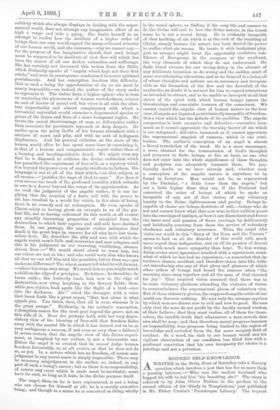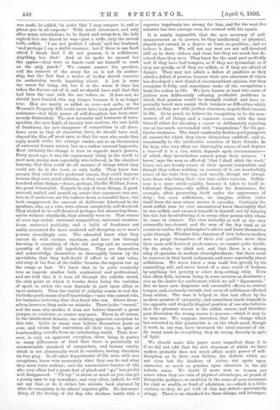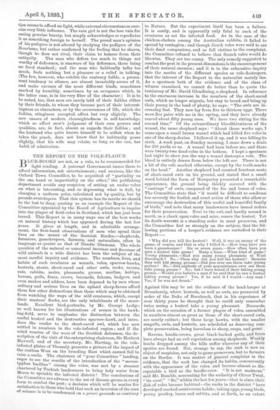MODERN SELF-KNOWLEDGE.
AWRITER in the Daily News of Saturday asks a literary question which involves a jest that has for us more than a passing interest,—" Who was the modest husband who begged his wife to tell him his besetting sin P' The story is referred to by John Oliver Hobbes in the preface to the second edition of his Study in Temptations,' just published in Mr. Fisher Unwin's Pseudonym Library.' The request was made, he added, in order that I may conquer it, and so please you in all respects.' With much reluctance, and only after many exhortations to be frank and outspoken, the lady replied that she feared he was—just a trifle, only the merest trifle, selfish. 'I am not perfect, I admit,' said her husband, and perhaps I am a sinful creature ; but if there is one fault which I thank God I do not possess, it is selfishness. Anything but that.' And as he spoke he passed her -the apples—they were at lunch—and set himself to work on the only peach." We cannot answer the question, and the interest of the story for us is not its author- ship, but the fact that a writer of to-day should conceive its authorship worth inquiring about. A jest is none the worse for being old, but it is the worse if time has taken the flavour out of it, and we should have said that this had been the case with the one before us. It does not, we should have fancied, bite any longer, because it is no longer true. Men are nearly as selfish as ever—not quite, or the Women's Property Bill could never have been passed without resistance—but their power of self-deception has been enor- mously diminished. The new intensity and keenness of intro- spection, the new depth of inquiry into motives, the new habit of frankness, the new sharpness of competition in all direc- tions, even in that of character, have, we should have said, cleared the film off most eyes, so that the man who made that reply would strike the average reader, not as an illustration of universal human nature, but as a rather unusual' hypocrite. Most certainly the change is true as regards men's powers. Forty years ago, it was the commonest thing in the world to meet men, young men especially, who believed, in the simplest honesty, that they could do all manner of things which they could not do in the least, or only badly. They knew lan- guages, they could write profound essays, they could impress women, they were great athletes, or they could do any one of a hundred other things,—dance, perhaps, like Sir William Jones, the great Orientalist. Experts in any of these things, if good- natured, smiled and passed on, aware that argument was use- less, or, if malicious, set the talkers down as boastful liars ; but both exaggerated the amount of deliberate falsehood in the speakers, who, as a rule, were almost completely self-deceived. They wished to be self-deceived perhaps, but measuring them- selves without standards, they actually were so. That source of error has ended; universal competition, universal examina- tions, universal publicity, and a habit of frankness not easily accounted for have rendered self-deception as to men's powers exceedingly rare. The educated know what they cannot do with curious exactness, and have lost through knowing it something of their old energy and an amazing quantity of their old hopefulness. They see themselves and acknowledge themselves so thoroughly beaten by the specialists, that they half-doubt if effort is of any value, and stop at the foot of the ladder because the experts run up the rungs so fast. We know that to be quite comically true as regards studies both academical and professional, and are told that it is true all through the athletic world, the only point at which it breaks down being the varieties of sport in which the man depends in part upon allies or upon animals. Then the vanity of judging comes in and dis- turbs the perfectness of self-knowledge,—men who cannot ride, for instance, believing that they know who can. About them- selves, however, they make no mistake. There is the " record," and the man who studies it does not believe himself a great jumper, or cricketer, or runner any more. There is, of course, in the intellectual domain, one striking apparent exception to this rule. Quite as many men believe themselves poets as ever, and retain that conviction all their lives, in spite of heartrending rebuffs from an unbelieving world. That, how- ever, is only an apparent exception, there being in poetry so many differences of kind that there is practically no unanswerable standard of comparison, and human vanity, which is not abnormally weak in versifiers, having therefore its free play. In all other departments of life, men, with rare exceptions, know very accurately what they can do and what they must leave undone; and the unconscious boaster of old, who very often had a great deal of pluck and " go," has pretty well disappeared. " I'll try," is about as much as you can get a young man to say nowadays ; and very often, indeed, he will not say that, or do it either, but shrinks back alarmed by what he recognises to be others' superior gifts. He has some- thing of the feeling of the dog who declines battle with a superior hopelessly too strong for him, and for the next five minutes has lost courage even for contest with his equals.
It is nearly impossible that the new accuracy of self- measurement as to powers, be they intellectual or physical, should not extend, in a degree at least, to qualities ; and we believe it does. We will not say men are not self-deceived still as to their virtues and vices, but they are much lees de- ceived than they were. They know for the most part perfectly well if they have bad tempers, or if they are tyrannical, or if they are greedy, or if they are selfish, or if they are afraid of danger. They may not admit a defect of qualities as they admit a defect of powers, because their new clearness of vision has developed a new dread of ciroumambient opinion, but they recognise it fully, and sometimes make of the recognition a basis for action in life. We have known at least two oases of jealous men deliberately refusing profitable positions in which that passion would be strongly excited, and have re- peatedly heard men assign their tempers as difficulties which would, as they saw with perfect clearness, impede their success in life. As to greed, we believe its recognition to be the com- monest of all things, and a constant reason with the man himself either for choosing a career or deliberately rejecting one as too much surrounded with "temptations" for his par- ticular weakness. The timid constantly decline good prospects of careers for which they know themselves unfitted ; and so, occasionally to the intolerable vexation of their friends, do the lazy, who very often are thoroughly aware of and deplore a vice—if it is a vice, which depends upon circumstances— of which they nevertheless cannot purge their natures. know,' says the man so affected, that I shall shirk the work.', Liars, too, are keenly aware of their special temptation, and though they refuse nothing on account of it, are wonderfully aware of the risks they run, and usually, though not always hate those who bring their vice into active exercise. Selfish- ness is a more subtle quality, because it takes to itself in- tellectual disguises,—the selfish desire for dominance, for example, often presenting itself under the appearance of duty ; but even selfishness, we imagine, seldom hides itself from the man whose nature it corrodes. Certainly the most selfish man we ever encountered knew thoroughly that he was selfish, and excused himself to himself, not by denying his vice, but by attributing it to every other person with whom he came in contact. The view inwardly as well as the view outwardly has cleared, and the men of the day tend at all events to realise the philosopher's advice and know themselves quite through. Whether this clearness of view induces modern men to purge themselves of their evil qualities more than their more self-deceived predecessors, we cannot quite decide. On the whole, we think not, and that there is a strong alloy of cynicism in modern clearsightedness ; but there must be reserves in that harsh judgment, and more especially about selfishness. We never knew a man made less greedy by his controlling will, and never heard of a man cured of laziness by anything but poverty or other deep-cutting whip. Even that often fails, laziness being in some natures as dominant a vice as the desire for excitement which we call " dipsomania." But we have seen desperate and successful efforts to control temper, and, curiously enough, real cures of selfishness effected from within. The man is helped in that last effort by the modern passion of sympathy, and sometimes lands himself in the opposite and stupidly illogical position of one who believes that the pleasant course is the selfish course, and therefore past discussion the wrong course to pursue,—which it may be or may not. We suppose, therefore, that the change which has occurred in this generation is on the whole good, though it must, in one way, have increased the total amount of sin. So many must do everything they do wrong directly in spite of light.
We should make this paper more imperfect than it is if we did not add that the new clearness of which we have spoken probably does not much affect men's power of self- deception as to their own foibles, the defects which are not vices but the shadows of virtue, not spots upon character, so much as patches upon character in the old toilette sense. We doubt if more men or women are aware when they are vain of physical advantages, or proud of things like pedigree, or snobbish in the sense of over-reverence for rank or wealth, or fond of adulation, or—which is a little curious, as they do get told of this last defect—pecuniarily stingy. There is no standard for these things, and introspec. lion seems to afford no light, while external circumstances exer- cise very little influence. The vain girl is not the less vain for seeing genuine beauty, but simply acknowledges or repudiates It as something foreign to herself. The proud man's opinion of his pedigree is not altered by studying the pedigree of the Bourbons, but rather confirmed by the feeling that he shares, 'though he does not rival, their claim to honour from their antiquity. The man who defers too much to things not worthy of deference, is unaware of his deference, there being no fixed standard ; and the man who habitually talks too much, feels nothing but a pleasure or a relief in talking. (The few, however, who exhibit the contrary foible, a perma- nent tendency to silence, are almost invariably aware of it, and make excuses of the most different kinds, sometimes marked by humility, sometimes by an arrogance which, in the latter case, is in the very fibre of the character.) It is to be noted, too, that men are rarely told of their foibles either by their friends, to whom they become part of their interest- bigness as characters, or by the occurrences of life, which the foibles, stinginess excepted, affect but very slightly. The ,new causes of modern clearsightedness in self-knowledge, which so affect men's judgment of their own powers and qualities, are, in fact, absent as regards their foibles ; and the husband who quite knows himself to be selfish when he takes the peach, does not know that he habitually poses slightly, that his wife may retain, as long as she can, her habit of admiration.




































 Previous page
Previous page